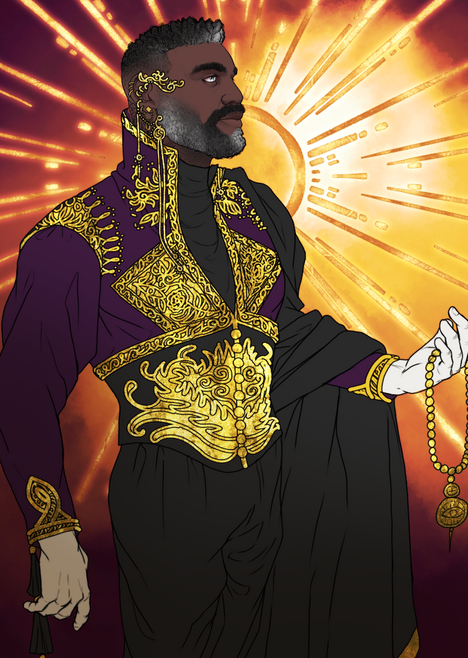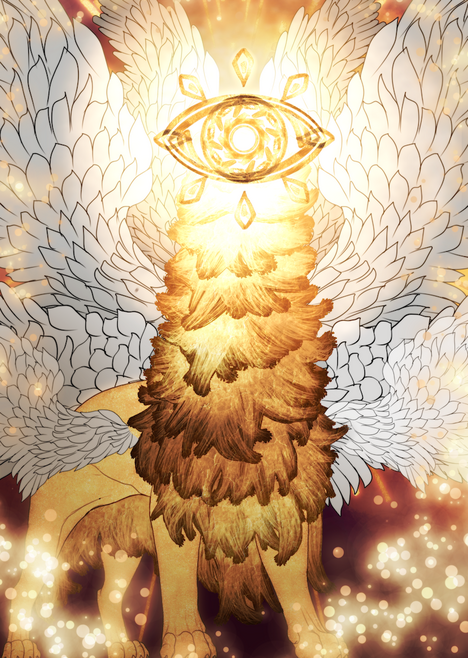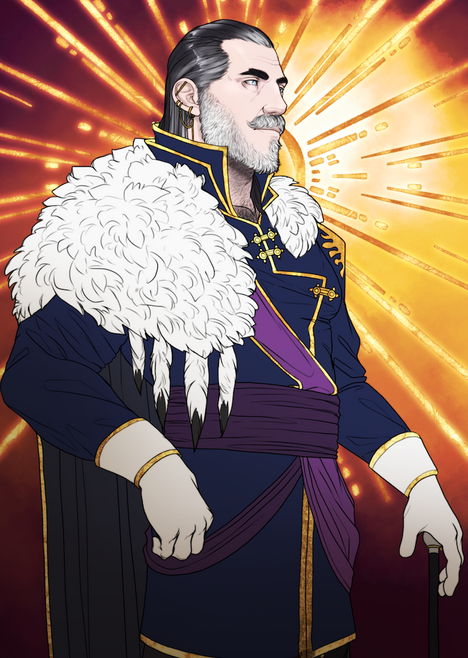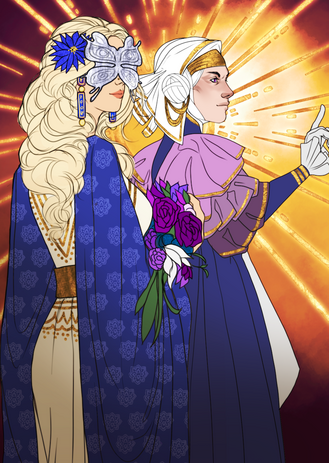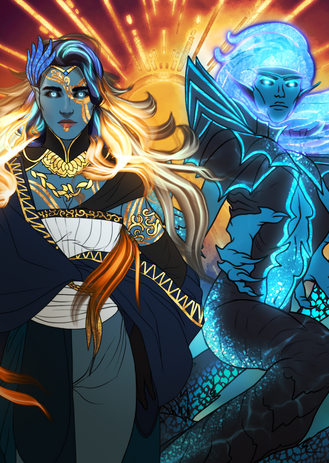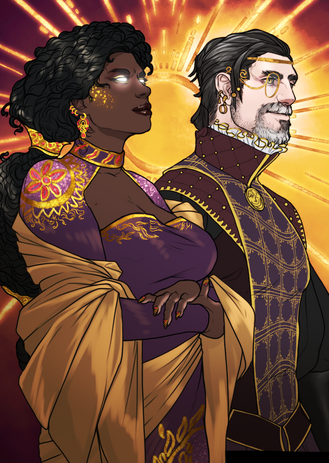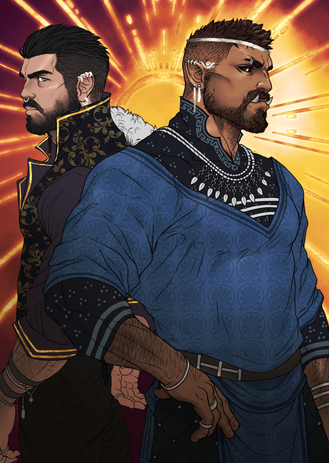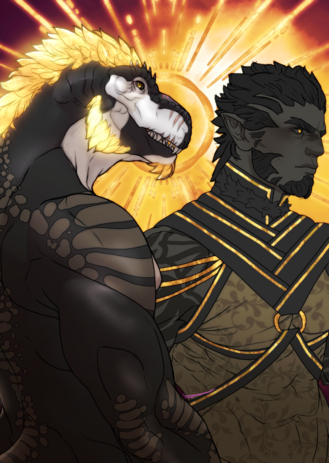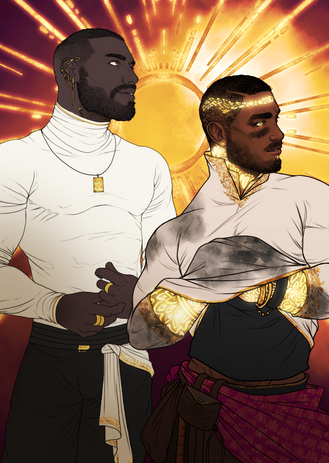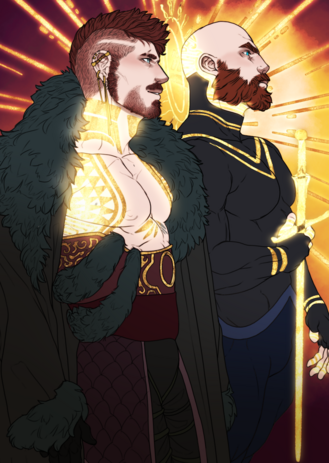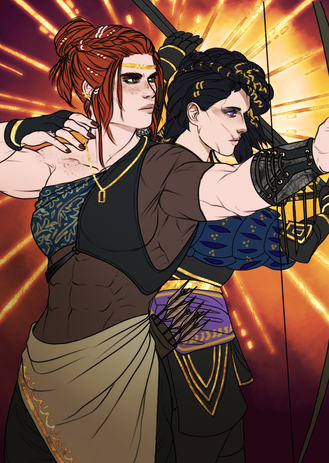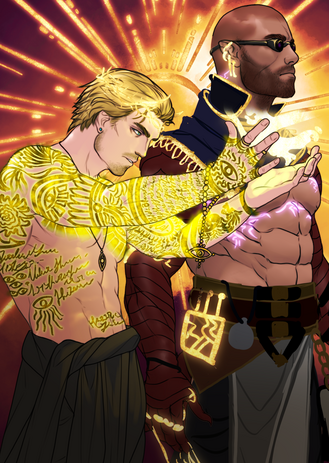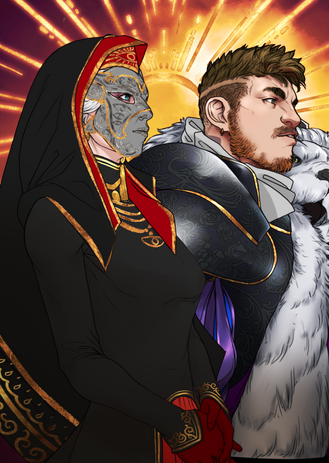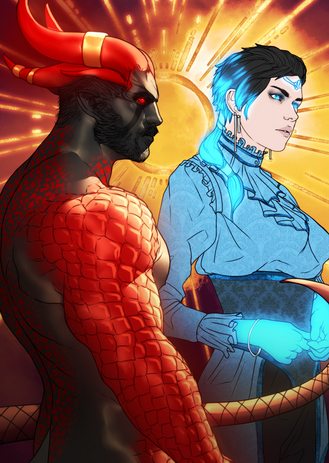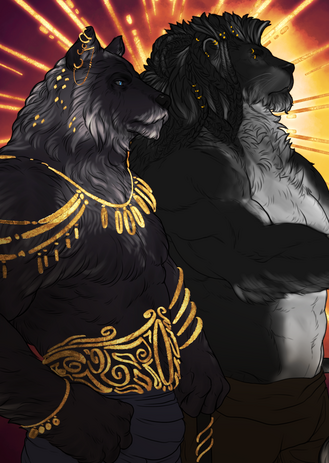More actions
No edit summary |
No edit summary |
||
| Line 10: | Line 10: | ||
|}} | |}} | ||
==Gods and Goddesses== | |||
Unionist Gods and Goddesses are found within the central pantheon, and two additional cults. Within the pantheon, the Gods are divided into the three Divine Paramounts, and the 24 Divine Virtues. These Divine Virtues are divided into groups of two, each being referred to as a God-union, usually with a shared theme or message within the dogma. While the Divine Paramounts are free of sin or flaw, the Divine Virtues act as lessons to the faithful to guide their life and reach fulfillment for the Great Way. Beyond the central pantheon are the Guided and Evintarian Cults, these Cults have additional optional Gods, but they are not mandatory for the faith itself, only if a believer follows their core theological message. Note, some of the Gods found in the Pantheon are Joined Gods. This term describes a God who is initially part of another pantheon, but either due to conquest or integration, they either wholly join the Unionist pantheon, or have dual-membership between multiple religions, a form of polytheistic pluralism that proposes the Religion will keep expanding, as the Regalian Empire absorbs more cultures and Religions. | |||
===The Divine Paramount=== | ===The Divine Paramount=== | ||
<gallery mode="packed-overlay" widths="220px" heights="439px"> | <gallery mode="packed-overlay" widths="220px" heights="439px"> | ||
| Line 17: | Line 18: | ||
File:Emperor.png|''Alexander, Vessel God'' | File:Emperor.png|''Alexander, Vessel God'' | ||
</gallery> | </gallery> | ||
* '''Theomar''' Theomar is the Prophet of Unionism, the first Vessel of the Everwatcher, and the first to speak and write the holy word of the faith in the Creed. Theomar does not represent any virtues, but he is still the most invoked God of Unionism, because he represents all the good virtues combined together. While all other Gods bar the Everwatcher have some kind of inherent flaw, Theomar is always considered the leader of the pantheon of Gods, and generally flawless. | |||
* '''Everwatcher''' The Everwatcher is the enigmatic God being that spoke to Theomar about the gospel. No living or dead person has ever seen the Everwatcher, bar the Emperors of the Regalian Empire to whom it speaks divine will. The Everwatcher is said to be the source of all creation, even Dragons, but because it is such a mystifying being that only speaks through the Emperors, few can be said about it other than to invoke its name for good wishes or prayers. | |||
* '''Alexander''' Alexander is the Vessel of Unionism, which is a rotating Godhood position held by the faith. When the previous Emperor dies, they lose their divinity, and it passes to the next Vessel as the new Emperor is crowned. Emperors can be flawed and sinners, but are made divine by the whispers of the Everwatcher which only they can hear in divine conclave. As such, Emperors of Regalia while alive are held to god-like status among the faithful. | |||
===The Divine Virtues=== | ===The Divine Virtues=== | ||
<gallery mode="packed-overlay" widths="220px" heights="309px"> | <gallery mode="packed-overlay" widths="220px" heights="309px"> | ||
| Line 30: | Line 30: | ||
File:Mairani.png|''Marani and Al-Asir, Virtues of altruism'' | File:Mairani.png|''Marani and Al-Asir, Virtues of altruism'' | ||
</gallery> | </gallery> | ||
* '''Ness and Eora''' Ness (left) was the 4th Empress of Regalia Nessaria Calontir, and Eora (right) was the 4th Channcelor Eotranna I Kade. Ness was full of sinful indulgence, taking to the pleasures of life and absconding with duties of court and motherhood. Through the guidance of Eora, the both of them reached a higher state of virtue in duty and responsibility, living up to their roles in life, and being the mothers of the nation that gave all blessed forgiveness and nurture. | |||
* '''Sinnavei and Vyrë''' Sinnavei (left) is the Goddess of honor and dignity, and Vyrë (right) is the Goddess of the unknown seas. Both were Estelley Gods incorporated when the Elven lands joined. Vyrë represents the sin of Bellicosity, with violence as a first answer, while Sinnavei showed her temperance and restraint as a more powerful tool to victory. Together they represent the virtue of caution and calmness, and receive offerings for safe passage on the seas and unknown lands. | |||
* '''Glanzia and Juvin''' Glanzia (left) is a mundanely raised (still living) Goddess, and Juvin (right) was the 11th Emperor of Regalia Heinrich III Ivrae Heiligenblut. Both were full of sin in their own ways, Glanzia towards her enemies, Juvin towards facts contradicting his knowledge. Through each other, they learned purity, Glanzia to seek reason over hatred, and Juvin to seek knowledge expansion over dogma. Together they are the virtue of pure soul and pure thought and knowledge. | |||
* '''Brand and Allest''' Brand (left) was the 17th Chancellor of Regalia, and Allest (right) was the 15th Emperor of Regalia Allestrain I Ivrae Heiligenblut. Allestrain was full of the sin of injustice, a soldier Emperor so beset with warfare and wroth, that he treated his subjects and nobles most foul. Through the guidance of Brand, Allest bettered his approach, and became a paragon of justice who saw to it that every injustice that reached him, would be answered by his sword. | |||
* '''Tanthor and Dari''' Tanthor (right) and Dari (left) are both mundanely raised (still living) Gods who were once crime lord and city guard respectively. Tanthor lived a life of contempt for the state, spitting at any help offered. Dari however slowly showed him the value of loyalty to the state, of the wealth and fame even the most downtrodden can achieve by working with the hierarchy and order rather than being a child of chaos. Both became paragons of the social contract of the Empire. | |||
* '''Marani and Al-Asir''' Marani (left) is mundanely raised and Al-Asir (right) is a Draconism God (both still living). Marani was full of the sin of blightcraft, the usage of technology to hurt and deceive, to use machines for foul deeds. Al-Asir showed him the virtue of technomoralism the idea that machines and inventions should serve progress and to better the lives of others, and that evil only comes from the use, not nature of technology. They represent altruism to the people. | |||
<gallery mode="packed-overlay" widths="220px" heights="309px"> | <gallery mode="packed-overlay" widths="220px" heights="309px"> | ||
File:Ewnolvenn.png|''Neall and Nolven, Virtues of culture'' | File:Ewnolvenn.png|''Neall and Nolven, Virtues of culture'' | ||
| Line 39: | Line 44: | ||
File:Furrieskings.png|''Mendes and Hor, Virtues of bravery'' | File:Furrieskings.png|''Mendes and Hor, Virtues of bravery'' | ||
</gallery> | </gallery> | ||
* '''Neall and Nolven''' Neall (left) is a Fornoss God (Aedán), and Nolven is an enigmatic twin of Neall. Neall represents the sin of Iconoclasm, the irreverent destruction of cultural heritage, or purposeful burning of art to hurt society. Neall showed Nolven the virtue of preservation and respect for diversity, and together they now represent the varied juxtaposition of art and military. Nolven is also responsible for Unionist Godborn, who usually become holy warriors or paladins. | |||
* '''Elia and Leona''' Elia (left) was the 15th Empress of Regalia, Leona (right) was the Knight-wife of the 15th Chancellor. Elia was the sin of Opulentia, a complete disregard for any social class in the Empire save for the wealthiest, caring only for their needs, and defending only their interests. Through Leona, Elia learned that the Empire is only as strong as its lowest foundations, and to ply true equity to the social classes in opportunities to serve the faith. | |||
* '''Kaldric and Caan''' Kaldric (left) was a mundanely raised Calemberg crimelord, Caan is a (still-living) Aelrrigan Mage-Knight of mysterious origins. Kaldric was the sin of Maleficence, the usage of the divinely burdened gift of Magic for personal pleasure and enrichment. Magic to Unionism is a great moral burden, which Caan taught him, so that he could better put his fate to work serving the Great Way. Both now represent the Magic moralism and the correct way of using Magic. | |||
* '''Celest and Eoin''' Celest (left) is a mundanely raised Nun, Eoin (right) is a mundanely raised Imperial Guard (both still living). Eoin was full of the sin of Hubris, to find such pride and vanity in his prestigious position in life, that he showed no regard for the actual weight of his obligation or venerability to elders and authority. Celest taught him the lessons of respect for those that came before, to honor his elders, and to serve their needs, and to respect the words of the sages. | |||
* '''Belialus and Erlys''' Belialus (left) was a Demon, Erlys (right) was a pre-Empire Goddess of the Weard faith of the Breizh people who joined the Unionist pantheon. Belialus was a being of Contempt, showing no esteem or reverence to his enemies and suffering defeat as a result. Erlys not only taught him humility and bravery in the face of one's enemies, she also reformed him and cleansed him of his sinful Demonhood, both representing the virtues of honesty and reform. | |||
* '''Mendes and Hor''' Mendes (left) is a Baskarr God, Hor is a mundanely raised Asha (both still living). Mendes was full of the sin of Defeatism, the loss of his people, the suffering, it all became too much for him to bear. He gave in to despair and loss, and gave up on everyone. Hor taught him the virtue of action, and the value of time, how limited the means of mortals are to act, and the duties gods have to be diligent. They now represent the virtues of diligence and activeness. | |||
Revision as of 02:54, 16 July 2024
| Unionism | |
|---|---|
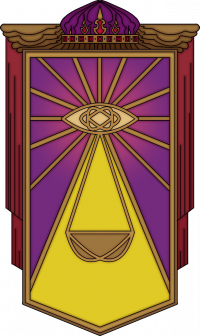 | |
| Religion | |
| Pronunciation | Yoon-yen-is-m |
| Origins | Emperor Theomar |
| Deities | |
| The Everwatcher and various other Gods and Goddesses | |
Gods and Goddesses
Unionist Gods and Goddesses are found within the central pantheon, and two additional cults. Within the pantheon, the Gods are divided into the three Divine Paramounts, and the 24 Divine Virtues. These Divine Virtues are divided into groups of two, each being referred to as a God-union, usually with a shared theme or message within the dogma. While the Divine Paramounts are free of sin or flaw, the Divine Virtues act as lessons to the faithful to guide their life and reach fulfillment for the Great Way. Beyond the central pantheon are the Guided and Evintarian Cults, these Cults have additional optional Gods, but they are not mandatory for the faith itself, only if a believer follows their core theological message. Note, some of the Gods found in the Pantheon are Joined Gods. This term describes a God who is initially part of another pantheon, but either due to conquest or integration, they either wholly join the Unionist pantheon, or have dual-membership between multiple religions, a form of polytheistic pluralism that proposes the Religion will keep expanding, as the Regalian Empire absorbs more cultures and Religions.
The Divine Paramount
- Theomar Theomar is the Prophet of Unionism, the first Vessel of the Everwatcher, and the first to speak and write the holy word of the faith in the Creed. Theomar does not represent any virtues, but he is still the most invoked God of Unionism, because he represents all the good virtues combined together. While all other Gods bar the Everwatcher have some kind of inherent flaw, Theomar is always considered the leader of the pantheon of Gods, and generally flawless.
- Everwatcher The Everwatcher is the enigmatic God being that spoke to Theomar about the gospel. No living or dead person has ever seen the Everwatcher, bar the Emperors of the Regalian Empire to whom it speaks divine will. The Everwatcher is said to be the source of all creation, even Dragons, but because it is such a mystifying being that only speaks through the Emperors, few can be said about it other than to invoke its name for good wishes or prayers.
- Alexander Alexander is the Vessel of Unionism, which is a rotating Godhood position held by the faith. When the previous Emperor dies, they lose their divinity, and it passes to the next Vessel as the new Emperor is crowned. Emperors can be flawed and sinners, but are made divine by the whispers of the Everwatcher which only they can hear in divine conclave. As such, Emperors of Regalia while alive are held to god-like status among the faithful.
The Divine Virtues
- Ness and Eora Ness (left) was the 4th Empress of Regalia Nessaria Calontir, and Eora (right) was the 4th Channcelor Eotranna I Kade. Ness was full of sinful indulgence, taking to the pleasures of life and absconding with duties of court and motherhood. Through the guidance of Eora, the both of them reached a higher state of virtue in duty and responsibility, living up to their roles in life, and being the mothers of the nation that gave all blessed forgiveness and nurture.
- Sinnavei and Vyrë Sinnavei (left) is the Goddess of honor and dignity, and Vyrë (right) is the Goddess of the unknown seas. Both were Estelley Gods incorporated when the Elven lands joined. Vyrë represents the sin of Bellicosity, with violence as a first answer, while Sinnavei showed her temperance and restraint as a more powerful tool to victory. Together they represent the virtue of caution and calmness, and receive offerings for safe passage on the seas and unknown lands.
- Glanzia and Juvin Glanzia (left) is a mundanely raised (still living) Goddess, and Juvin (right) was the 11th Emperor of Regalia Heinrich III Ivrae Heiligenblut. Both were full of sin in their own ways, Glanzia towards her enemies, Juvin towards facts contradicting his knowledge. Through each other, they learned purity, Glanzia to seek reason over hatred, and Juvin to seek knowledge expansion over dogma. Together they are the virtue of pure soul and pure thought and knowledge.
- Brand and Allest Brand (left) was the 17th Chancellor of Regalia, and Allest (right) was the 15th Emperor of Regalia Allestrain I Ivrae Heiligenblut. Allestrain was full of the sin of injustice, a soldier Emperor so beset with warfare and wroth, that he treated his subjects and nobles most foul. Through the guidance of Brand, Allest bettered his approach, and became a paragon of justice who saw to it that every injustice that reached him, would be answered by his sword.
- Tanthor and Dari Tanthor (right) and Dari (left) are both mundanely raised (still living) Gods who were once crime lord and city guard respectively. Tanthor lived a life of contempt for the state, spitting at any help offered. Dari however slowly showed him the value of loyalty to the state, of the wealth and fame even the most downtrodden can achieve by working with the hierarchy and order rather than being a child of chaos. Both became paragons of the social contract of the Empire.
- Marani and Al-Asir Marani (left) is mundanely raised and Al-Asir (right) is a Draconism God (both still living). Marani was full of the sin of blightcraft, the usage of technology to hurt and deceive, to use machines for foul deeds. Al-Asir showed him the virtue of technomoralism the idea that machines and inventions should serve progress and to better the lives of others, and that evil only comes from the use, not nature of technology. They represent altruism to the people.
- Neall and Nolven Neall (left) is a Fornoss God (Aedán), and Nolven is an enigmatic twin of Neall. Neall represents the sin of Iconoclasm, the irreverent destruction of cultural heritage, or purposeful burning of art to hurt society. Neall showed Nolven the virtue of preservation and respect for diversity, and together they now represent the varied juxtaposition of art and military. Nolven is also responsible for Unionist Godborn, who usually become holy warriors or paladins.
- Elia and Leona Elia (left) was the 15th Empress of Regalia, Leona (right) was the Knight-wife of the 15th Chancellor. Elia was the sin of Opulentia, a complete disregard for any social class in the Empire save for the wealthiest, caring only for their needs, and defending only their interests. Through Leona, Elia learned that the Empire is only as strong as its lowest foundations, and to ply true equity to the social classes in opportunities to serve the faith.
- Kaldric and Caan Kaldric (left) was a mundanely raised Calemberg crimelord, Caan is a (still-living) Aelrrigan Mage-Knight of mysterious origins. Kaldric was the sin of Maleficence, the usage of the divinely burdened gift of Magic for personal pleasure and enrichment. Magic to Unionism is a great moral burden, which Caan taught him, so that he could better put his fate to work serving the Great Way. Both now represent the Magic moralism and the correct way of using Magic.
- Celest and Eoin Celest (left) is a mundanely raised Nun, Eoin (right) is a mundanely raised Imperial Guard (both still living). Eoin was full of the sin of Hubris, to find such pride and vanity in his prestigious position in life, that he showed no regard for the actual weight of his obligation or venerability to elders and authority. Celest taught him the lessons of respect for those that came before, to honor his elders, and to serve their needs, and to respect the words of the sages.
- Belialus and Erlys Belialus (left) was a Demon, Erlys (right) was a pre-Empire Goddess of the Weard faith of the Breizh people who joined the Unionist pantheon. Belialus was a being of Contempt, showing no esteem or reverence to his enemies and suffering defeat as a result. Erlys not only taught him humility and bravery in the face of one's enemies, she also reformed him and cleansed him of his sinful Demonhood, both representing the virtues of honesty and reform.
- Mendes and Hor Mendes (left) is a Baskarr God, Hor is a mundanely raised Asha (both still living). Mendes was full of the sin of Defeatism, the loss of his people, the suffering, it all became too much for him to bear. He gave in to despair and loss, and gave up on everyone. Hor taught him the virtue of action, and the value of time, how limited the means of mortals are to act, and the duties gods have to be diligent. They now represent the virtues of diligence and activeness.
| ||||||||||
| Accreditation | |||||||
|---|---|---|---|---|---|---|---|
|
| ||||||
